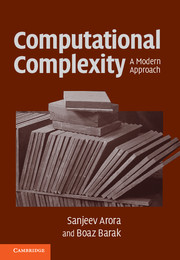Book contents
- Frontmatter
- Contents
- About this book
- Acknowledgments
- Introduction
- 0 Notational conventions
- PART ONE BASIC COMPLEXITY CLASSES
- PART TWO LOWER BOUNDS FOR CONCRETE COMPUTATIONAL MODELS
- PART THREE ADVANCED TOPICS
- Appendix: Mathematical background
- Hints and selected exercises
- Main theorems and definitions
- Bibliography
- Index
- Complexity class index
Hints and selected exercises
Published online by Cambridge University Press: 05 June 2012
- Frontmatter
- Contents
- About this book
- Acknowledgments
- Introduction
- 0 Notational conventions
- PART ONE BASIC COMPLEXITY CLASSES
- PART TWO LOWER BOUNDS FOR CONCRETE COMPUTATIONAL MODELS
- PART THREE ADVANCED TOPICS
- Appendix: Mathematical background
- Hints and selected exercises
- Main theorems and definitions
- Bibliography
- Index
- Complexity class index
Summary
Chapter 0
0.2 Answers are: (a) n (b) n2 (c) 2n (d) log n (e) n (f) n log n (g) nlog 3 (h) n2.
Chapter 1
1.1 Follow the grade-school algorithms.
1.5 Use the proof of Claim 1.6.
1.6 show that the universal TM U obtained by the proof of Theorem 1.9 can be tweaked to be oblivious.
1.12. b. By possibly changing from S to its complement, we may assume that the empty function φ (that is not defined on any input) is in S and that there is some function f that is defined on some input x that is not in S. Use this to show that an algorithm to compute fS can compute the function HALTx, which outputs 1 on input α iff Mα halts on input x. Then reduce computing HALT to computing HALTx thereby deriving Rice's Theorem from Theorem 1.11.
Chapter 2
2.2 CONNECTED and 2COL are shown to be in P in Exercise 1.14 (though 2COL is called BIPARTITE there). 3COL is shown to be NP-complete in Exercise 2.21, and hence it is unlikely that it is in P.
2.3 First show that for every rational matrix A, the determinant of A can always be represented using a number of bits that is polynomial in the representation of A. Then use Cramer's rule for expressing the solution of linear equations in terms of determinants.
Information
- Type
- Chapter
- Information
- Computational ComplexityA Modern Approach, pp. 531 - 544Publisher: Cambridge University PressPrint publication year: 2009
